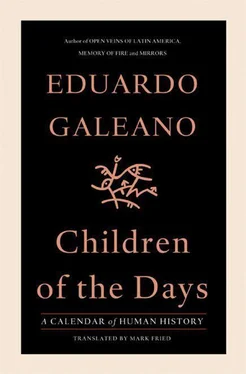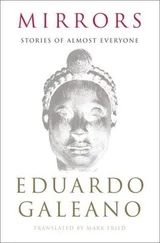Today in 1955 Albert Einstein died.
For twenty-two years the FBI tapped his telephone, read his mail and went through his garbage.
They spied on Einstein because he was a spy for the Russians. So said his bulky police file. The file also said he had invented a death ray and a robot that could read minds. It said Einstein was a member, collaborator or fellow traveler of thirty-four Communist front organizations between 1937 and 1954, and was honorary chair of three Communist organizations. It concluded: “It seems unlikely that a man of his background could, in such a short time, become a loyal American citizen.”
Not even death saved him. They continued spying on him. Not the FBI, but his colleagues, men of science who sliced his brain into two hundred forty pieces and analyzed them to find an explanation for his genius.
They found nothing.
Einstein had already warned, “I have no special gift. I am only passionately curious.”
April 19. CHILDREN OF THE CLOUDS
In 1987 the king of Morocco finished building a north — south wall across the Sahara Desert, on lands that do not belong to him.
This is the longest wall in the world, exceeded only by the Great Wall of China. All along it Moroccan soldiers block the Saharawi people from entering their land.
Several times the United Nations confirmed the people of Western Sahara’s right to self-determination and called for a plebiscite to allow them to determine their own fate.
But the kingdom of Morocco has refused and continues to refuse. That refusal is a confession. By denying the vote, Morocco confesses to having stolen a country.
For forty years the Saharawi people have been waiting. They are condemned to a life sentence of anguish and nostalgia without parole.
They call themselves “children of the clouds,” because since time immemorial they have pursued the rains. They also pursue justice, which is harder to find than water in the desert.
April 20. MANUFACTURING MISTAKES
It was among the largest military expeditions ever launched in the history of the Caribbean. And it was the greatest blunder.
The dispossessed and evicted owners of Cuba declared from Miami that they were ready to die fighting for devolution, against revolution.
The US government believed them, and their intelligence services once again proved themselves unworthy of the name.
On April 20, 1961, three days after disembarking at the Bay of Pigs, armed to the teeth and backed by warships and planes, these courageous heroes surrendered.
April 21. THE INDIGNANT ONE
It happened in Spain in a town of La Rioja on the evening of this day in 2011, during an Easter procession.
A huge crowd watched in silence as Jesus Christ, being whipped by Roman soldiers, passed by.
A voice broke the silence.
Seated on his father’s shoulders, Marcos Rabasco shouted at the man being whipped: “Fight back! Fight back!”
Marcos was two years, four months and twenty-one days old.
Einstein once said, “If the bee disappears from the surface of the earth, man would have no more than four years to live. No more bees, no more pollination. no more men!”
He said it to a few friends.
The friends laughed.
He did not.
Now it turns out there are fewer and fewer bees in the world.
Today, on Earth Day, let us acknowledge that this is not happening due to God’s will or the Devil’s curse, but rather because of:
the murder of natural forests and the proliferation of farmed ones;
monocropping for export, which limits plant diversity;
poisons that kill pests and with them everything else;
chemical fertilizers that fertilize money and sterilize the soil;
and radiation from the machines people buy because advertising tells us to.
April 23. FAME IS BALONEY
Today, World Book Day, it wouldn’t hurt to recall that the history of literature is an unceasing paradox.
What is the most popular scene in the Bible? Adam and Eve biting the apple. It’s not there.
Plato never wrote his most famous line: “Only the dead have seen the end of war.”
Don Quijote de la Mancha never said: “Let the dogs bark, Sancho. It’s a sign we are on track.”
Voltaire’s best-known line was not said or written by him: “I do not agree with what you have to say, but I will defend to the death your right to say it.”
Georg Wilhelm Friedrich Hegel never wrote: “All theory is gray, my friend, but green is the tree of life.”
Sherlock Holmes never said: “Elementary, my dear Watson.”
In none of his books or pamphlets did Lenin write: “The ends justify the means.”
Bertolt Brecht was not the author of his most oft-cited poem: “First they came for the Communists / and I didn’t speak out because I wasn’t a Communist. “
And neither was Jorge Luis Borges the author of his best-known poem: “If I could live my life over / I would try to make more mistakes. ”
April 24. THE PERILS OF PUBLISHING
In the year 2004, for once the government of Guatemala broke with the tradition of impunity and officially acknowledged that Myrna Mack was killed by order of the country’s president.
Myrna had undertaken forbidden research. Despite receiving threats, she had gone deep into the jungles and mountains to find exiles wandering in their own country, the indigenous survivors of the military’s massacres. She collected their voices.
In 1989, at a conference of social scientists, an anthropologist from the United States complained about the pressure universities exert to continually produce: “In my country if you don’t publish, you perish.”
And Myrna replied: “In my country if you publish, you perish.”
She published.
She was stabbed to death.
April 25. DON’T SAVE ME, PLEASE
During this week in 1951, Mohammad Mossadegh was elected prime minister of Iran in a landslide.
Mossadegh had promised to take back Iran’s oil, which had been given away to the British.
But nationalizing oil could lead to the sort of chaos that helps the Communists. So President Eisenhower gave the order to attack and the United States saved Iran. The coup d’état of 1953 put Mossadegh in prison, sent many of his followers to their graves and gave forty percent of the oil Mossadegh had nationalized to US companies.
The following year, far from Iran, President Eisenhower gave another order to attack and the United States saved Guatemala. A coup d’état toppled the democratically elected government of Jacobo Arbenz because he had expropriated the uncultivated lands of the United Fruit Company. Expropriating land could lead to the sort of chaos that helps the Communists.
Guatemala is still paying for that act of kindness.
April 26. NOTHING HAPPENED HERE
It occurred in Chernobyl in Ukraine in 1986.
It was the worst nuclear catastrophe the world had ever suffered, but the only ones to learn of the tragedy from the first moment were the birds that fled and the worms that dug themselves into the ground.
The Soviet government ordered silence.
Radioactive rain fell over much of Europe and the government continued denying or refusing to speak.
A quarter of a century later, in Fukushima, several nuclear reactors exploded and the Japanese government also remained silent or denied “alarmist versions.”
The veteran British journalist Claud Cockburn was right when he suggested, “Never believe anything until it has been officially denied.”
April 27. LIFE’S TWISTS AND TURNS
Читать дальше












